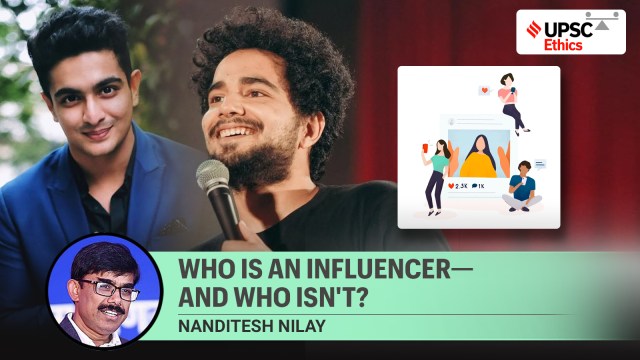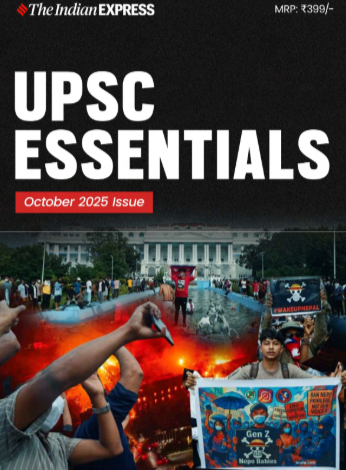© IE Online Media Services Pvt Ltd
Latest Comment
Post Comment
Read Comments
 The Ranveer Allahbadia controversy has been making headlines, news and noise. Apart from other things, the debate also revolves around a basic ethical question which is more relevant in today's time.
The Ranveer Allahbadia controversy has been making headlines, news and noise. Apart from other things, the debate also revolves around a basic ethical question which is more relevant in today's time.Relevance: The Ranveer Allahbadia controversy has been making headlines, news and noise. Apart from other things, the debate also revolves around a basic ethical question which is more relevant in today’s time: Does being an influencer mean ‘Free Thinking’ minus the ‘Values’? UPSC Ethics Simplified draws your attention to topics related to applied ethics. UPSC recently has been focussing on contemporary issues and raising some ethical questions for the candidates. In the past, we have viewed Pollution, War, Sports and Finance from the prism of ethics. Today, Nanditesh Nilay, who writes fortnightly for UPSC Essentials, takes us through an important question — ‘Who is an influencer?’
The Universal Declaration of Human Rights (Article 19) states, “Everyone has the right to freedom and opinion.” In simple ways, it affirms the right to freedom of expression but where to draw the moral boundaries? Morality in communication is similar to morality elsewhere, the ones which we have been reading and writing in the Ethics simplified series since the beginning. Family values in moral communication are an integral part too. Immoral communication can often be subjective and culturally relative, but universal values still exist. One of these values is human dignity, as well as the relationship between parents and children, which forms the foundation of family values.
Recently, a YouTuber’s crude comments challenged these values and sparked concern about the impact of online content on children. This incident also reminds us of the growing influence of social media and how it impacts our daily lives. If the expressions of influencers are the new ‘normal’ of the online world, are we ready for this shift?
Leo Tolstoy rightly writes in Anna Karenina, “A free thinker used to be a man who had been educated on ideas of religion, law, morality,and had arrived at free thought by his own struggle and toil; but now a new type of born free thinker has been appearing, who’ve never even heard that there have been laws of morality and religion, and that there are authorities, but who simply grow up with negative ideas about everything, that is savages.” So, any influencer must prioritize respectful communication and dialogue, ensuring values. Most importantly, we need to discuss who truly is an influencer in our society.
On March 27, 2022, at the 94th Academy Awards, Will Smith shocked the world when he walked onto the stage and slapped comedian Chris Rock for making an unscripted joke about his wife, Jada Pinkett. Violence of any kind, verbal or physical, should not be accepted. There are two aspects of the recent controversy which has led to a nationwide debate. First, what should be the boundaries of humour and entertainment? Second, how to communicate and express in the age of digital media, where every second person wants to be an influencer.
Mahatma Gandhi’s three monkeys teach the values of seeing no evil, hearing no evil, and speaking no evil. Are those monkeys relevant today, or have they adjusted to the ‘roast’ world? Are we redefining the line between entertainment and awkwardness? Especially for our children (who are constantly exposed to screens watching content of all kinds) and parents who are afraid that their children will one day ask about viral moments like the recent controversy.
During the pandemic and pollution crises, we used masks to shield ourselves from harm. Our digital devices, too, are safeguarded by antivirus software. Yet, in the realm of communication, no such filters exist anymore.
Over the past five years, OTT platforms have dismantled moral boundaries, allowing unrestricted content to flow freely. Capital ‘A’ is replaced by bold and uglier truth. Now by reading in detail about the presence of foul language, crime, and sex viewers prepare to watch or ignore. Everybody holds their phone in their palm so it becomes comfortable to be present on that OTT platform. The comfort and the portability need a corner where those taboos can be heard and seen. And that with a hope that others around are blind and deaf.
Now the question is whether such expressions are the reflection of society. If yes, then it means that viewers love to watch those repeatedly used foul words that have been accepted as a new normal communication pattern. Do you agree with such acceptance? When a joke that hurts the value system of society is cracked, is it just the performer who is at fault, or others who laughed at it too? And where does that leave the media’s responsibility?
In an era dominated by digital influence, who are the real opinion shapers? The Cambridge Dictionary defines an influencer as someone who affects the thoughts and behaviors of others. Under the illusion of virtual followers, they are categorized as Nano, Micro, Macro, or Mega influencers. Here is a thought to ponder — Are influencers just entertainers, for whom cracking a joke about everything is what they define as humour? What about acknowledging their responsibilities towards society, especially through their acts?
As creators and consumers, if we continue to generate and share unfiltered content as a part of the ‘cool’ world, we need to ask ourselves: Are we simply replicating what we see around us, or are we creating something fresh and creative in a true sense? This question becomes more relevant for the new age influencers.
The Cambridge Dictionary defines an influencer as someone who shapes opinions and behaviors. Wrapped in layers of virtual followers, they fall into Nano, Micro, Macro, and Mega categories. But do these platforms—and their stars—understand responsibility, or is everyone just a clown in a digital circus?
How can a nation afford such unchecked freedom, where language is neither civil nor ashamed, and crime and nudity threaten the fabric of social institutions?
From the dawn of speech, communication set humans apart. As Yuval Noah Harari said, “Sapiens’ unique trait is our ability to create and believe fiction.” Unlike animals, we don’t just describe reality—we shape new ones. But when communication loses its meaning? Incidents of hate speech or obscene comedy are common answers. Communication in true spirit has a sense of responsibility attached to it. Or as Max Scheler put it, “Communication constructs both the individual and the social person.”
But do we care about what communication means in this world that struggles to define values, ethics, and the essence of what makes us human? We should else face ethical dilemmas as many influencers face today.
What about Sanatan Sanskriti—the foundation of Sanatan Dharma, which upholds timeless moral duties that are eternal and universal? Family values, respect for parents, and ethical living have been central to our civilizational ethos. Can any responsible political or social institution justify or support the degradation of these values through so-called “media influencers” who thrive on sensationalism and vulgarity? Certainly not. Even some state governments have intervened, setting the right precedent from the government’s side.
But beyond the legal framework, what about the growing obsession among youth to create content—often devoid of values—merely for views and monetary gain? Is this the cultural trajectory that will shape Viksit Bharat 2047? The answer is no!
Influencers today hold immense power in shaping public perception, creating new societal norms, and role models, especially among the youth. Influencers focusing on viral trends for their bread and butter, create a fan following among the new generation. But such influencers forget the fine line between creativity and cultural erosion. And since communication is a powerful social tool, without the compass of ethics, it becomes mere noise. And that is scary for the pollution it creates in the minds of our children.
The solution must begin from home and parents should not become confused or weak in addressing such conduct and communication challenges. Children must witness their parents’ conduct and choices as well. All etiquette is fine but society evolves through virtues. If a son or daughter carries testimonies of ethical memories of their parents living, then certainly they will handle the state of ethical dilemma well. So parenting must begin with human values of trust, care, responsibility, and respect. In a society that boasts of brand, money and profile values, it is urgent to board human values and make them act as an input in personality. If Human Values act as an input, Ethics by default becomes output. Ethics is an understanding that gives us reason to decide what is right and what is not right act/ conduct in any society per se. If parents compromise on ethics and values, it will be a failure in parenting.
Beyond home, schools play a very important role in shaping the minds of the young generation. Teachers have a great responsibility to inculcate values that make leaders and morally strong nations. No doubt that governance ensures compliance with the law. But there is a limit to which law can address ethical matters. It is homes and schools that shape the character of a civilization and that is crucial.
Swami Vivekananda’s inspirational speech—”Sisters and Brothers of America”— was a reminder that when one speaks about values, the world listens. That was the power of an influencer. On the path of Viksit Bharat 2047, we must ensure that India’s new-age influencers influence the world with wisdom, strong values, and culture which have been hallmarks of our Indian society — even through entertainment, especially through entertainment.
Whenever faced with so-called “cool” questions that are laced with boastful displays of wealth, pride, and arrogance—where human values are overshadowed by everything else—one can’t help but recall Shashi Kapoor’s timeless lesson in ethical communication in Deewar. Confronting Amitabh Bachchan’s question, “Tumhare Pass Kya Hai?” Shashi Kapoor responded, “Mere Paas Ma Hai.” Check out this iconic scene which is a reminder that dialogues and performances based on our value system can be an effective response to moral dilemmas of all ages. It is also a lesson for the ‘cool’ influencers of our times: take a moment to reflect, learn from your actions, and prioritize virtues over vices in communication. Remember, mediocrity and vices must never take over our core values. Deevar will always be iconic and original. Crass will be crass.
(The writer is the author of ‘Being Good and Aaiye, Insaan Banaen’, ‘Ethikos: Stories Searching Happiness’ and ‘Kyon’. He teaches courses on and offers training in ethics, values and behaviour. He has been the expert/consultant to UPSC, SAARC countries, Civil services Academy, National Centre for Good Governance, Central Bureau of Investigation (CBI), Competition Commission of India (CCI), etc. He has PhD in two disciplines and has been a Doctoral Fellow in Gandhian Studies from ICSSR. His second PhD is from IIT Delhi on Ethical Decision Making among Indian Bureaucrats. He writes for the UPSC Ethics Simplified (concepts and caselets) fortnightly.)
Subscribe to our UPSC newsletter and stay updated with the news cues from the past week.
Stay updated with the latest UPSC articles by joining our Telegram channel – Indian Express UPSC Hub, and follow us on Instagram and X.
For your queries and suggestions write at manas.srivastava@indianexpress.com.

Read UPSC Magazine


